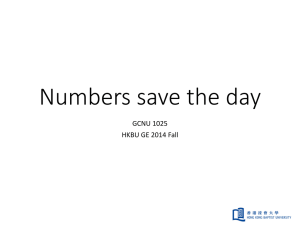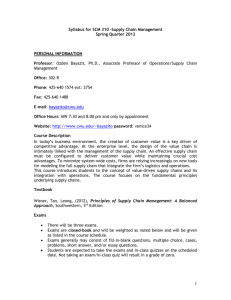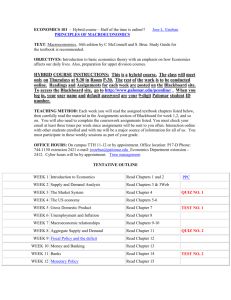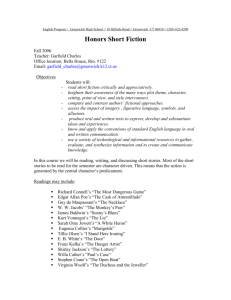University of North Texas at Dallas Fall Semester
advertisement
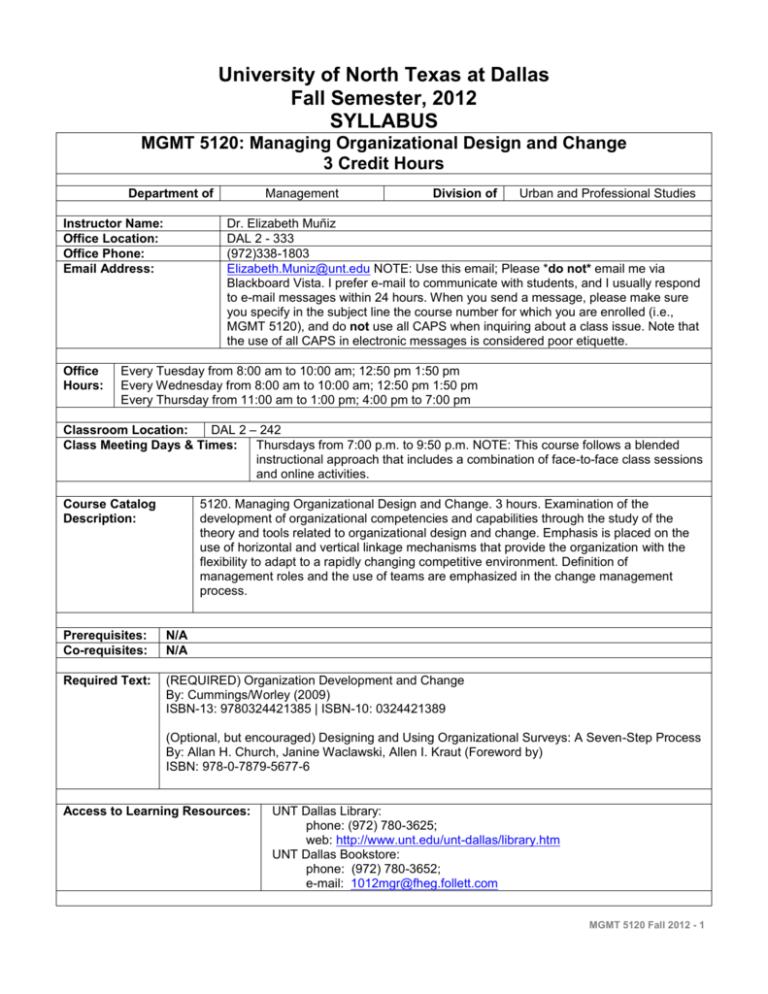
University of North Texas at Dallas Fall Semester, 2012 SYLLABUS MGMT 5120: Managing Organizational Design and Change 3 Credit Hours Department of Instructor Name: Office Location: Office Phone: Email Address: Office Hours: Management Division of Urban and Professional Studies Dr. Elizabeth Muñiz DAL 2 - 333 (972)338-1803 Elizabeth.Muniz@unt.edu NOTE: Use this email; Please *do not* email me via Blackboard Vista. I prefer e-mail to communicate with students, and I usually respond to e-mail messages within 24 hours. When you send a message, please make sure you specify in the subject line the course number for which you are enrolled (i.e., MGMT 5120), and do not use all CAPS when inquiring about a class issue. Note that the use of all CAPS in electronic messages is considered poor etiquette. Every Tuesday from 8:00 am to 10:00 am; 12:50 pm 1:50 pm Every Wednesday from 8:00 am to 10:00 am; 12:50 pm 1:50 pm Every Thursday from 11:00 am to 1:00 pm; 4:00 pm to 7:00 pm Classroom Location: DAL 2 – 242 Class Meeting Days & Times: Thursdays from 7:00 p.m. to 9:50 p.m. NOTE: This course follows a blended instructional approach that includes a combination of face-to-face class sessions and online activities. Course Catalog Description: 5120. Managing Organizational Design and Change. 3 hours. Examination of the development of organizational competencies and capabilities through the study of the theory and tools related to organizational design and change. Emphasis is placed on the use of horizontal and vertical linkage mechanisms that provide the organization with the flexibility to adapt to a rapidly changing competitive environment. Definition of management roles and the use of teams are emphasized in the change management process. Prerequisites: Co-requisites: N/A N/A Required Text: (REQUIRED) Organization Development and Change By: Cummings/Worley (2009) ISBN-13: 9780324421385 | ISBN-10: 0324421389 (Optional, but encouraged) Designing and Using Organizational Surveys: A Seven-Step Process By: Allan H. Church, Janine Waclawski, Allen I. Kraut (Foreword by) ISBN: 978-0-7879-5677-6 Access to Learning Resources: UNT Dallas Library: phone: (972) 780-3625; web: http://www.unt.edu/unt-dallas/library.htm UNT Dallas Bookstore: phone: (972) 780-3652; e-mail: 1012mgr@fheg.follett.com MGMT 5120 Fall 2012 - 1 A version of this syllabus is available on Blackboard (i.e., e-campus, WebCT). I will be posting announcements, documents, etc. on Blackboard and you will use it to submit all course related assignments as directed. All information on Blackboard takes precedence over this printed version of the syllabus. Check Blackboard regularly! Course Goals or Overview: The goals of this course are to 1. encourage an in depth exploration of the concepts of organization development and change. 2. provide exposure to academic and practitioner treatments of organization development and change. 3. examine potential career paths in the field of organizational development by comparing and contrasting the approaches of a few highly recognized OD practitioners. 4. examine client-consultant relationship issues such as contracting and professional ethics. Learning Objectives/Outcomes: At the end of this course, 1. Students will be able to identify organizational situations that would benefit from organization development interventions. 2. Students will be able to diagnose the organizational systems issues at the level of the individual, small group, inter-group, organization, and organization/environment levels of analysis. 3. Students will explain the limitations of conventional analytical frameworks in hyperturbulent organizational environments. 4. At a foundational level, students will be able to diagnose and plan an intervention that will increase organizational effectiveness. 5. Students will be able to easily locate professional resources/tools available to the practitioner. 6. Students will be able to identify ways to utilize the personal self as an instrument in the change process. Course Outline Date Meeting 1 In-Class Activities 8/30 Introduction to Course Introduction to Teams Meeting 2 9/6 Class Activities/Assignments Assignments: Read Chapters 1 – 3 Individual Assignment #1 (non-graded – classroom discussion): Be prepared to describe in detail a specific process at your work place. How does this process provide value to the individual, team, and organization? Describe what the output of this process should provide and if this is effective. Come prepared for a short in-class presentation. Learning Objectives: 1. Define the concept of OD and recognize the need for change and renewal. 2. Describe OD and understand historical origins of OD. 3. Examine the concepts of change. In-Class Activities Lecture from Readings (Chapters 1 – 3): Introduction to OD, planned change, and OD Practitioner. Presentations: Individual Assignment #1 Assignments: Read Chapters 4 – 7 Case Study #1 (non-graded – classroom discussion): Read case study Kenworth Motors (pp. 212 – 216). Download case study discussion guide from Blackboard. Come prepared to discuss with your team and then for an in-class discussion. Team 1 will lead this discussion. Team Assignment #1 – (graded): Research and describe how an organization would determine, deploy, and control a change to a significant procedure. In this paper (3 MGMT 5120 Fall 2012 - 2 Meeting 3 9/13 pages max.), describe the specific procedure that would be changed and how the procedure provides value to the individual, team, and organization. Describe the overall process that would be used by the organization to make the required changes to the procedure. Prepare a 5 minute class presentation (no more than 3 slides). Learning Objectives: 1. Define the role of the OD Consultant. 2. Identify system parameters and recognize symptoms, problems, and root cause. 3. Understand learning and change to drive desired change. 4. Discuss the transformation of organizations, self directed teams, future search conferences, centers of excellence, and fast cycle OD. 5. Begin to apply a systematic diagnosis to process situations. In-Class Activities: Lecture from Readings (Chapters 4 – 7): Contracting, diagnosing processes, groups, jobs, and collecting and analyzing the data. Case Study Discussion: Kenworth Motors (pp. 212 – 216) Meeting 4 9/20 Assignments: Read Chapters 8 – 11 Case Study #2 (non-graded – classroom discussion): Read case study Peppercorn Dining (pp. 217 – 238). Download case study discussion guide from Blackboard. Come prepared to discuss with your team and then for an in-class discussion. Team 2 will lead this discussion. Team Project#1 (graded and due end of the semester): Identify a process from your work environment to improve. This may be the same process that you have discussed in your individual assignment #1. See the Project Improvement Plan – Executive Summary Paper and Presentation section below. Learning Objectives: 1. Identify the resistance forces in individuals, teams and organizations. 2. Recognize intervention theory and socio-technical systems theory. 3. Begin to diagnose the resistant forces in an organization change. 4. Recognize intergroup problems in organizations and organizational culture. 5. Perform an analysis of the provided case study. Construct a short summary, assess the key issues, formulate a root cause, propose a course of action, and select the best COA. In-Class Activities: Presentations: Team Assignment #1 – Organizational Change Lecture from Readings (Chapters 8 – 11): Feedback, designing interventions, lead and manage change, and process intervention. Case Study Discussion: Peppercorn Dining (pp. 217 – 238) On-Line Activity Submit Team Assignment #1 – Organizational Change Paper Assignments Read Chapters 12-13 Case Study #3 (non-graded – classroom discussion): Read case study Ben and Jerry’s: Team Development Intervention (pp. 304 – 313). Download case study discussion guide from Blackboard. Come prepared to discuss with your team and then for an in-class discussion. Team 3 will lead this discussion. Team Assignment #2 (graded): Research and describe various methods and logistics for implementing and controlling a change. In this paper (3 pages max.), describe in detail a process that the organization would use to ensure that determined changes and requirements are incorporated into the organization’s system. Also describe how the organization will control or monitor this change for effectiveness. Prepare a 5 minute class presentation (no more than 3 slides). MGMT 5120 Fall 2012 - 3 Meeting 5 9/27 Learning Objectives 1. Understand the change strategies. 2. Recognize the need for employee empowerment interventions. 3. Recognize interventions that resolve conflict, improve relations, and enhance planning and decision making procedures. 4. Utilize interpersonal communication styles in driving change. 5. Perform an analysis of the provided case study. Construct a short summary, assess the key issues, formulate a root cause, propose a course of action, and select the best COA. In-Class Activities Lecture from Readings (Chapters 12 – 13): Human process interventions, empowerment, and organization approaches. Case Study Discussion: Ben and Jerry’s: Team Development Intervention (pp. 304 – 313). Meeting 6 10/4 Meeting 7 10/11 Meeting 8 10/18 Assignments Study for Exam 1 (Chapters 1 – 13) Read Chapters 14 – 16 Case Study #4 (non-graded – classroom discussion): Read case study City of Carlsbad California: Restructuring the Public Works Department (pp. 405 – 407). Download case study discussion guide from Blackboard. Come prepared to discuss with your team and then for an in-class discussion. Team 4 will lead this discussion. Submit Exam 1 (Chapters 1 – 13) Due at 11:59 pm Team Meetings – Mandatory Attendance Learning Objectives 1. Understand and incorporate Kaizen processes into the OD program. 2. Understand the critical success factors in long term change projects. 3. Identify change process implementation techniques. 4. Understand the negative effects of competition on organization effectiveness. 5. Perform an analysis of the provided case study. Construct a short summary, assess the key issues, formulate a root cause, propose a course of action, and select the best COA. In-Class Activities Presentations: Team Assignment #2 - Organizational Change Methods Lecture from Readings (Chapters 14 – 16): Change implementation, and technostructural interventions Case Study Discussion: City of Carlsbad California: Restructuring the Public Works Department (pp. 405 – 407) On-Line Activities Submit Team Assignment #2 – Organizational Change Methods Assignments Read Chapters 17 - 19 Case Study #5 (non-graded – classroom discussion): Read case study C & S Wholesale Grocers: Self Managed Teams (pp. 408 – 418). Download case study discussion guide from Blackboard. Come prepared to discuss with your team and then for an in-class discussion. Team 5 will lead this discussion. Team Assignment #3 (graded) – Research the Kaizen and 5 “S” approach and describe its basic processes (3 pages). In addition, explain in detail how Kaizen would be used in your current work environment and what would need to be changed in order to deploy Kaizen. MGMT 5120 Fall 2012 - 4 Meeting 9 10/25 Learning Objectives 1. Describe the major OD quality and productivity interventions. 2. Discuss OD execution, issues, and challenges in significant organizations. 3. Perform an analysis of the provided case study. Construct a short summary, assess the key issues, formulate a root cause, propose a course of action, and select the best COA. In-Class Activities Lecture from Readings (Chapters 17 – 19): Developing talent, diversity, and performance management. Case Studies. Case Study Discussion: C & S Wholesale Grocers: Self Managed Teams (pp. 408 – 418). Meeting 10 11/1 Assignments Read Chapters 20 – 22 Case Study #6 (non-graded – classroom discussion): Read case study Leading Strategic Change at DaVita (pp. 597 – 612). Download case study discussion guide from Blackboard. Come prepared to discuss with your team and then for an in-class discussion. Team 6 will lead this discussion. Learning Objectives 1. Understand how self directed teams, ethics, HR practices drive successful change. 2. Identify change evaluation techniques. 3. Demonstrate diagnosis, design, implementation, evaluation, and enhancement techniques in a process improvement plan. 4. Demonstrate OD interventions and communication techniques in the presentation of the PIP. In-Class Activities Lecture from Readings (Chapters 20 – 22): Transformational, continuous, and trans organizational change. Presentations: Team Assignment #3 – Kaizen Research Case Study Discussion: Leading Strategic Change at DaVita (pp. 597 – 612) On-Line Activities Submit Team Assignment #3 – Kaizen Research Paper Meeting 11 11/8 Assignments Read Chapters 23 – 25 Case Study #7 (non-graded – classroom discussion): Read case study B.R. Richardson Timber Products Corporation (pp. 712-727). Download case study discussion guide from Blackboard. Come prepared to discuss with your team and then for an in-class discussion. Learning Objectives 1. Understand the basic issues in using OD as an approach for planned change. 2. Identify future trends and problems facing OD practitioners. 3. Identify the change enhancement techniques used for ongoing change. 4. Demonstrate diagnosis, design, implementation, evaluation, and enhancement techniques in a process improvement plan. 5. Demonstrate OD interventions and communication techniques in the presentation of the PIP. In-Class Activities Lecture from Readings (Chapters 23 – 25): OD and the future, change enhancement. Case Study Discussion: B.R. Richardson Timber Products Corporation (pp. 712-727 Meeting 12 11/15 Submit Exam 2 (Multiple Choice Part) DUE at 11:59 pm Submit Exam 2 (Self Reflection paper) DUE at 11:59 pm MGMT 5120 Fall 2012 - 5 11/22 Thanksgiving Break Meeting 13 Team Meetings – Mandatory Attendance 11/29 Meeting 14 Process Improvement Plan Team Presentations (3 teams) 12/6 Meeting `5 Process Improvement Plan Team Presentations (3 teams) 12/13 This schedule is subject to change by the instructor. Changes to this schedule will be communicated by WebCT email. Course Evaluation Methods This course will utilize the following instruments to determine student grades and proficiency of the learning outcomes for the course. Components Max Points Components Max Points Team Assignment #1 10 Team Assignment #2 10 Team Assignment #3 10 PIP Team Project 40 Exam 1 100 Exam 2 100 TOTAL 270 At the end of the course, 243 points and above = A; 216 – 242 points = B; 189 – 215 points = C; 162 – 188 points = D; 161 – 0 points = F. Final numeric scores will NOT be rounded (e.g., 215 at the end of the course will be a “C”, 242 will be a “B”, etc.). Final scores/grades will NOT be “curved” or “adjusted”. Adjustment of Exam scores may be made immediately after the exam (not at the end of the course) after analysis of the frequency of questions missed. I do not discuss or disclose any grade information over the phone or by email. Please visit me during office hours to discuss grades. Note that an “A” clearly stands out as excellent work. A “B” demonstrates a thorough grasp of the subject matter and indicates high quality performance and solid work. A “C” meets the requirements of the course and represents average work. The social loafing policy may significantly affect your team project grade(s). Please read social loafing policy for team projects. This policy is posted on WebCT. Feel free to ask your instructor any questions about this policy. Description of Required Activities Team Assignments These are assignments that will be completed with your team. They are typically papers (3 pages maximum) answering questions related to the topics of class discussion. Include the first and last name of all team members who contributed to the paper. All references must be cited in APA style. Exam 1 This online exam will contain multiple choice items testing your comprehension of and ability to integrate material associate with the first half of the semester. Exam 2 This online exam will have two parts. The first part will contain multiple choice items testing your comprehension of and ability to integrate material associate with the second half of the semester. The second part will be a self MGMT 5120 Fall 2012 - 6 assessment/retrospective describing how the course objectives have been achieved for you specifically. You will address the following questions: What have you learned in this course that you will believe will influence the way you conduct research in organizational change and development? (Assume you will conduct this sort of research: Mandatory for doctoral students and optional any other students interested in research). What have you learned in this course that you believe will influence the way you practice organizational change and development in the future? (Assume that you will be an OD practitioner of some sort: Mandatory for all students). What competencies do you need to develop further to be a more proficient OD practitioner? What will be your development strategy? (Mandatory for all students). Note: You are encouraged to keep a journal of your in-class experiences to use as a resource in writing this paper. This portion of the exam is due Thursday August 2, 2012. Limit your answers to 3 pages (12 pt., 1.5 margins, Times, excluding title page and references). Submit your file to “Exam II. Self –Assessment” on Blackboard. Team Project Process Improvement Plan (PIP) – Executive Summary Paper and Presentation: The team is required to present the paper to the class. The presentation should be no more than 20 minutes including any discussion following the presentation. You may pick a process from work that fits organizational development change requirements. It must be clearly understood, generates data, and subject to improvement. The improvement process must show frequent, repetitive, and measurable key indicators and generate data that can be measured. Illustrate with a dummy data set how the data would be measured and analyzed. The improvement plan must include a specific recommendation to improve the process, and it must include how the implementation change will be driven and how the success of the implementation plan will be measured. This assignment will include the PIP, the Executive Summary (see below), and presentation materials. Executive Summary: The Executive Summary paper (about 3 pages) must summarize the following: (The Presentation should cover the following items utilizing the 3D & 2E approach. You will need to incorporate the processes of OD, human and HR management intervention, technostructural interventions, and strategic interventions.) 1. Introduction and background of issue 2. Problem statement, critical issue list, current state of the process, cost, time. 3. Cause analysis of issue. 4. Flow charts of the current process and new designed process including the variance for critical measured items such as time and cost. 5. Proposed solutions and best course of action - Recommendations for improvement. 6. Measurement systems used and data analysis. 7. Resource requirements and impact to customers and employees. 8. Implementation or deployment plan. 9. Benefits from improvement. 10. Summary and conclusion. Turn in the written PIP including graphs, charts, drawings, etc., Executive Summary (3 pages maximum), and a copy of the presentation materials. MGMT 5120 Fall 2012 - 7 University Policies and Procedures Students with Disabilities (ADA Compliance): The University of North Texas Dallas faculty is committed to complying with the Americans with Disabilities Act (ADA). Students' with documented disabilities are responsible for informing faculty of their needs for reasonable accommodations and providing written authorized documentation. For more information, you may visit the Office of Disability Accommodation/Student Development Office, Suite 115 or call Laura Smith at 972-7803632. Policy on Missing Exams & Other Assignments: SPECIAL NOTICE: There is no provision for missing or making up a missed assignment, case study, presentation, or any other syllabus specified component of this class. Further, no component of this course will be administered at a time different than that provided in the course syllabus. Verifiable cases of birth; death; serious family and/health problems; act of God (unpreventable events resulting from natural causes such as hurricanes, tornadoes, floods, and storms – accidents which are not the results of human factors); transportation accidents, bona fide racial, ethnic, cultural, religious, age, gender, or disability factors; UNT official events may constitute grounds for accommodation and will be dealt with on a case-by-case basis. Work, marriage, personal or work-related travel, and other personal situations not described above DO NOT constitute grounds for accommodation. If the above policy does not suit your situation, then please make other enrollment arrangements. Academic Integrity: (Source: Code of Conduct and Discipline at the University of North Texas section of the Student Guidebook.) The University of North Texas Code of Student Conduct and Discipline provides penalties for misconduct by students, including academic dishonesty. Academic dishonesty includes cheating. The term cheating includes, but is not limited to the following: plagiarism of any kind, including intra- or inter-term copying of the Discussion Posts of others; the use of any unauthorized assistance in taking exams; dependence upon the aid of sources beyond those authorized by the instructor in writing papers, preparing reports, solving problems, or carrying out other assignments; and the acquisition, without permission, of exams or other academic material belonging to a faculty member or staff of the university (i.e., removing exams from the classroom or teaching assistant's office and accepting exams from fellow students). If an individual engages in any form of academic dishonesty related to this course, he/she will receive a letter grade of "F" in the course in addition to a letter grade of "F" on the course activity to which the academic dishonesty pertains. The student's case will be immediately referred to the Dean of Students Office for appropriate disciplinary action. This policy is intended to protect honest students from unfair competition with unscrupulous individuals who might attempt to gain an unfair advantage through academic dishonesty. The expectation is that the instructor and all students will adhere to all guidelines of UNT's Code of Student Conduct and all information at the Center for Student Rights and Responsibilities website http://www.unt.edu/csrr/student_conduct/index.html. Bad Weather Policy: On those days that present severe weather and driving conditions, a decision may be made to close the campus. In case of inclement weather, call UNT Dallas Campuses main voicemail number (972) 780-3600 or search postings on the campus website www.unt.edu/dallas. Students are encouraged to update their Eagle Alert contact information, so they will receive this information automatically. Attendance and Participation Policy: The University attendance policy is in effect for this course. Class attendance and participation is expected because the class is designed as a shared learning experience and because essential information not in the textbook will be discussed in class. The dynamic and intensive nature of this course makes it impossible for students to make-up or to receive credit for missed classes. Attendance and participation in all class meetings is essential to the integration of course material and your ability to demonstrate proficiency. Students are responsible to notify the instructor if they are missing class and for what reason. Students are also responsible to make up any work covered in class. MGMT 5120 Fall 2012 - 8 It is recommended that each student coordinate with a student colleague to obtain a copy of the class notes, if they are absent. Diversity/Tolerance Policy: Students are encouraged to contribute their perspectives and insights to class discussions. However, offensive and inappropriate language (swearing) and remarks offensive to others of particular nationalities, ethnic groups, sexual preferences, religious groups, genders, or other ascribed statuses will not be tolerated. Disruptions which violate the Code of Student Conduct will be referred to the Center for Student Rights and Responsibilities as the instructor deems appropriate. Student Evaluation of Teaching Effectiveness: The Student Evaluation of Teaching Effectiveness (SETE) is a requirement for all organized classes at UNT. This short survey will be made available to you at the end of the semester, providing you a chance to comment on how this class is taught. I am very interested in the feedback I get from students, as I work to continually improve my teaching. I consider the SETE to be an important part of your participation in this class. Miscellaneous: Cell phones, beepers, entertainment devices (iPods/MP3 players) and all other communications devices must be turned off prior to class, and remain off throughout class. If special circumstances require a student to have a communications device active during class, the student is requested to make arrangements with the professor prior to class. Your professor also reserves the right to change any of the requirements, procedures, schedules, assignments, and criteria contained in this Syllabus. A waiver by the professor of any specific item in this Syllabus for the class or for a particular student for a particular instance does not constitute a waiver of any other item in this Syllabus nor does it constitute a subsequent waiver of that particular item. Students who generally seem not to be paying attention in class (e.g., reading a newspaper, trying to check email/sending text messages, chatting with classmates, etc.) or who are disruptive, will be presumed to be so well prepared for that day’s class that they are actually frustrated at not being more actively involved in the class. Therefore, such behavior will serve as a signal to your professor that the student wishes to more actively participate in class and will be given the opportunity to do so. Note: Although we will be discussing various rules of law as they relate to particular situations presented in the assigned readings, we cannot discuss any personal “legal” situations pertaining to students. In particular, no legal advice can or will be given to any student. MGMT 5120 Fall 2012 - 9


